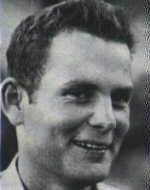Bar-Ner, Amnon
Son of Dan and Ruth. Born on January 1, 1950 in Kibbutz Hazorea, he studied at the elementary school in the kibbutz and in the “Shomria” secondary educational institution. Then he went into work and called the barnyard. During the Six-Day War he played an important role with other members of his group. In July 1968, he was drafted into the IDF and was the first to enlist in his group, although he preferred to volunteer for the pilot, but when he was not accepted, he accepted the law willingly and proudly and joined the Nahal Brigade. In the first year of his service, which was a difficult and arduous year, Amnon grew up and was found to have a desire and recognition. He went to the reconnaissance unit and was Simcha. And when he was given a responsible role, he would fill it with efficiency and skill. When he was injured while on duty and could therefore move to a lighter service, he did not do so. The sense of responsibility prompted him to return to his unit as soon as possible – and so he returned. As a soldier he wanted to play his part-not from the love of war, but from the necessity of it, for there was no aggression in him. One of his qualities was the love of man, and with it goodness and joy. Amnon loved the farm and the work in it and was going to give it to them with all his Lev after his release. Even when he came on holiday, he would not discuss military matters, but would collect material and focus on improving and improving his work. He loved to study and wanted to achieve – after he was released – what he had missed before. He served in his unit faithfully and with dedication and knew how to bear responsibility for him, in operational work and in command of soldiers. Yet he had a loving and understanding Lev. All his friends remember his smile, his energy and his willingness to contribute to others, even without being asked to do so. But he also knew how to demand from his men what he demanded of himself and could demand it firmly when he was convinced that he was right. Amnon was proud of being a member of a kibbutz, and more than once, in a joint conversation in his room, he frequently told about the joint education in the institution and the social life there. He also talked about the way his parents began and his older brothers, like Amnon, went on to return to the kibbutz after his military service, to work in the cowshed industry he loved so much, and to continue his hobbies (such as growing fish in his room). As a rule, he always wanted to contribute to the parties and cultural life of the agriculture, yet he loved to sit alone and listen to music. On August 30, 1970, he fell in the line of duty. He was laid to rest in Kibbutz Hazorea. In a letter of condolence to the family and to the kibbutz, his commander wrote: “Amnon was one of the most senior commanders in the company, he was considered a member of each and every one, and even while serving in command, he remained a member of his soldiers and commanders. After the publishing house published a booklet in his memory entitled “Emi”; A fountain that springs from water throughout the year near the kibbutz was renovated and planted with shrubs and trees, and it was named after Amnon, in his memory.
